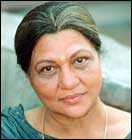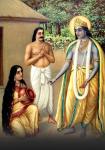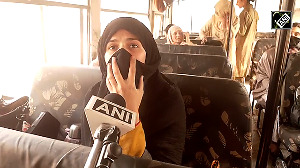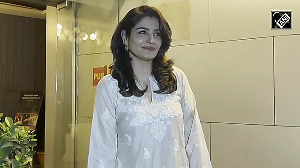Jitendra Kothari
 The announcement of Nirupa Roy's death severs one of our last remaining links to the Golden Age Of Bollywood.
The announcement of Nirupa Roy's death severs one of our last remaining links to the Golden Age Of Bollywood.
For many, Nirupa Roy was almost a generic term for 'screen mother.' This was after she played superstar Amitabh Bachchan's mother in a string of 1970s blockbusters. As the damp-eyed, long-suffering matriarch, she pulled at the heartstrings of a nation. A skilled actress, Nirupa would lay bare the emotional bruises that came with being the highly-moral centre of the hero's often sinister world.
But there was much more to Nirupa Roy than being a mother specialist who could unerringly locate the poignancy inside the sturdiest commercial film stereotype.
In a career that spanned half a century from 1946 to 1999, Nirupa has also done over a hundred films as a heroine.
| |||||||||||
Her beginnings, though, couldn't have been further removed from films.
|
Nirupa Roy classics | ||
|
Year |
Film |
Co-star |
|
1948 |
Gunsundari |
Manhar Desai |
|
1950 |
Har Har Mahadev |
Trilok Kapoor |
|
1953 |
Do Bigha Zameen |
Balraj Sahni |
|
1957 |
Janam Janam Ke Phere |
Manhar Desai |
|
1959 |
Rani Rupmati |
Bharat Bhushan |
|
1959 |
Bedard Zamana Kya Jaane |
Ashok Kumar |
|
1963 |
Mujhe Jeene Do |
-- |
|
1967 |
Ram Aur Shyam |
-- |
| 1975 | Deewar | -- |
| 1977 | Amar Akbar Anthony | -- |
|
1981 |
Kranti |
-- |
Born Kokila Bulsara in the south Gujarat town of Valsad, she had never seen a movie till she came to Mumbai as a 15-year-old bride.
When her husband and she answered an advertisement for actors in a Gujarati paper, she was the one from the couple who got chosen. Her husband magnanimously supported her and she made her debut in the Gujarati film, Ranakdevi (1946).
By the next year, she was doing small roles in Hindi films as well, often at Ranjit studios. The Gujarati-Hindi bilingual, Gunsundari (1948), made by a Ranjit affiliation, was Nirupa Roy's career-making film, in which she played a housewife who wins back her husband.
Nirupa was tagged the queen of the mythological films after she played Parvati to Trilok Kapoor's Shiv in Jayant Desai's immensely popular Har Har Mahadev (1950). Consequently, she became extremely busy over the next few years -- doing 16 films with Trilok Kapoor alone, and playing a variety of goddesses. So overpowering was her pious screen image that people would regularly come to her home, fall at her feet and ask for her blessings.
When Bimal Roy chose her to play Balraj Sahni's wife in Do Bigha Zameen (1953), Nirupa grabbed the chance to do something off-beat. She willingly wore unwashed clothes that had been bought from Bombay's Chor Bazaar. And having come from a village helped her mannerisms. As the beset-by-troubles bucolic housewife who makes a perilous solo journey to Kolkata, Nirupa was highly convincing with the sheer force of her emotions. Her performance was in keeping with the sentimental idiom of the day, albeit with a dash of realism.
This led to Nirupa doing several realist films in the mid 1950s, often alongside Sahni, like Amar Kumar's Garam Coat, Hemen Gupta's Taksaal and Krishen Chopra's adaptation of Premchand's Heera Moti. In Tangawali, also opposite Sahni, she had a Mother India kind of role, alongside truant son Shammi Kapoor.
| Famous songs picturised on Nirupa Roy | Film |
|
Hariyala sawan dhol machata aaya |
Do Bigha Zameen |
| Zara saamne toh aao chhaliye | Janam Janam Ke Phere |
| Chahe paas ho chahe door ho | Samrat Chandragupta |
| Aa laut ke aaja meet | Rani Rupmati |
| Unpar kaun kare vishwas | Kavi Kalidas |
| Main yahan tu kahan | Bedard Zamana Kya Jaane |
| Dhalti jaaye raat keh de dil ki baat | Razia Sultana |
| Shirdiwale Sai baba aaya hai tere | Amar Akbar Anthony |
Nirupa continued to prolifically play the heroine throughout the decade, though many of her films were low budget affairs. Her best phase came in the latter half of the 1950s when the devotional film Janam Janam Ke Phere (its song Zara saamne toh aao chhaliye topped the Binaca Geetmala countdown for that year) and the historical Amarsingh Rathod did well.
This led to better roles opposite heroes like Ashok Kumar in heroine oriented, glycerin-heavy films like Bedard Zamana Kya Jaane and a memorable trilogy opposite Bharat Bhushan -- Samrat Chandragupta, Rani Rupmati and Kavi Kalidas -- the last two directed by S N Tripathi had cinematic merit and unforgettable music.
With the advent of the 1960s, the heroine roles dwindled and Nirupa got slotted as the mother, especially after playing Asha Parekh's estranged mother in Hrishikesh Mukherjee's 1961 film, Chhaya (and winning another Filmfare award).
Other memorable roles in the decade include Mujhe Jeene Do (1963), in which she played a dignified matron whose husband is shot dead by a dacoit but who finds the humanity within herself to give shelter to the dacoit's wife and child when they are in trouble in the climax. In Shaheed (1966), she essayed another dignified character who helps a patriot escape while in Ram Aur Shyam (1967) she played Dilip Kumar's harassed sister who is browbeaten by Pran.
The crowning glory in Nirupa Roy's life however came in the 1970s when Vyjayanthimala turned down the chance to make a comeback with Yash Chopra's Deewar (1975). The author-backed role of a mother grappling with her son's (Amitabh Bachchan)'s transgressions and her own love for him came to Nirupa and she made it unquestionably her own. As the moral pivot of the film, Nirupa's role was far superior to that of the heroines, Parveen Babi and Neetu Singh. Projecting the straight-backed mother in the famous 'Mere paas maa hai' dialogue with perfection, Deewar ensured Nirupa Roy's place in movie history.
Deewar was followed by several Amitabh blockbusters where she played the mother -- Amar Akbar Anthony, Muqaddar Ka Sikander, Suhaag, Mard.
Having played Dharmendra's mother, she also played Sunny's mother in Betaab. But there was only so much variation that writers could bring to the role of a mother. She cut down on her work by the end of the 1980s and worked only intermittently in the 1990s.
Best friends with actress Shyama who lived a few buildings away, Nirupa retreated to a comfortable retirement. But she could not resist returning to the studios and evoking memories of another era when she played Amitabh's mother one last time in Lal Badshah (1999). After all, after 50 years and 250 films, she had devoted a large part of her life to her profession.






